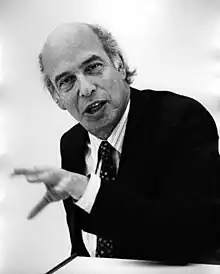Claus Moser, Baron Moser
Claus Adolf Moser, Baron Moser, KCB, CBE (24 November 1922 – 4 September 2015) was a British statistician who made major contributions in both academia and the Civil Service.[1][2] He prided himself rather on being a non-mathematical statistician, and said that the thing that frightened him most in his life was when Maurice Kendall asked him to teach a course on analysis of variance at the LSE.[3]
The Lord Moser | |
|---|---|
 | |
| Director of the Central Statistical Office | |
| In office 1967–1978 | |
| Preceded by | Harry Campion |
| Succeeded by | John Boreham |
| Personal details | |
| Born | Claus Adolf Moser 24 November 1922 Berlin, German Reich |
| Died | 4 September 2015 (aged 92) Chur, Switzerland |
| Citizenship | British |
| Nationality | British |
| Spouse | Mary Oxlin |
| Education | Frensham Heights School |
| Alma mater | London School of Economics |
| Occupation | Statistician |
| Military service | |
| Allegiance | United Kingdom |
| Branch/service | Royal Air Force |
| Years of service | 1943–1946 |
Life
Claus Adolf Moser was born in Berlin in 1922. His father was Dr Ernst (Ernest) Moser (1885–1957), owner of the private bank Ernst Moser & Co. in Berlin (est. 1902, liquidated in 1938). His mother was Lotte (née Goldberg, 1897–1976), a talented amateur musician. In 1936 he moved to England with his parents and his brother Heinz Peter August. He went to Frensham Heights School and the London School of Economics (LSE). Despite being Jewish, in 1940, he was interned as an enemy alien in Huyton Camp.
After four months, he was released and served in the Royal Air Force, 1943–1946. He then returned to LSE as Assistant Lecturer, then Lecturer, in Statistics, 1946–1955; Reader in Social Statistics, 1955–1961; Professor of Social Statistics, 1961–1970; Visiting Professor of Social Statistics, 1970–1975.
In 1965 he was elected a Fellow of the American Statistical Association.[4] He was appointed a Commander of the Order of the British Empire (CBE) in the 1965 New Year Honours,[5] and in 1965, he applied for a job at the Central Statistical Office but was rejected, as a former enemy alien. However, this did not seem to be a problem when in 1967 Harold Wilson appointed him Director of the Central Statistical Office. He was made a Knight Commander of the Bath (KCB) in the 1973 New Year Honours.[6] He resigned as Director of the Central Statistical Office in 1978.
He held a very wide variety of posts. These included:
- Member, Governing Body, Royal Academy of Music, 1967–1979
- Director, Central Statistical Office, 1968–1978
- BBC Music Advisory Committee, 1971–1983
- Visiting Fellow, Nuffield College, Oxford, 1972–1980
- Chairman, Royal Opera House, Covent Garden, 1974–1987
- Director, N M Rothschild & Sons, 1978–1990 (Vice-chairman, 1978–1984)
- President, Royal Statistical Society, 1978–1980
- Chairman, Economist Intelligence Unit, 1979–1983
- Warden of Wadham College, Oxford, 1984–1993[7]
- Chancellor, Keele University, 1986–2002
- Trustee, London Philharmonic Orchestra, 1988–2000
- President, British Association for the Advancement of Science, 1989–1990
- Pro-Vice-Chancellor, University of Oxford, 1991–1993
- Chairman, British Museum Development Trust, 1993–2003, later Chairman Emeritus
- Chancellor, Open University of Israel, 1994–2004
He was made a life peer with the title Baron Moser, of Regent's Park in the London Borough of Camden on 23 June 2001.[8] Other honours included the Albert Medal of the Royal Society of Arts, 1996, Commandeur de l'Ordre National du Mérite (France), 1976; Commander's Cross, Order of Merit (Germany), 1985.
Moser also received an Honorary Doctorate from Heriot-Watt University in 1995.[9]
While on holidays Moser died in Chur (Switzerland) on 4 September 2015, following a stroke.[10]
The Claus Moser Research Centre
Moser was honorary Chancellor at Keele University at a time of rapid change after funding cuts in the early 80s, and appointment of a full-time vice-chancellor to reduce staff / student ratios further after that first emergency. Keele's funding per student was reduced by a third and Oxford's by a thirtieth from similar amounts per head in the 70s.
In 1997 Moser participated in a ceremony to mark the start of construction of the Claus Moser Research Centre, a dedicated research facility for the Humanities and Social Sciences.[11] He returned to the university in June 2008 to participate in the official opening of the £3.5m building.[12]
See also
References
- Nissel, Muriel; Isaacs, Jeremy (6 September 2015). "Lord Moser obituary: Director of the Central Statistical Office who became chairman of the Royal Opera House". The Guardian. UK.
- "Lord Moser – obituary: Statistician, economist, academic and champion of the arts and sciences who believed that all should benefit from high culture". The Daily Telegraph. UK. 6 September 2015.
- Claus Moser and Julian Champkin, 'Lord Moser'. Significance, Wiley, 2 March 2007, doi:10.1111/j.1740-9713.2007.00217.x
- View/Search Fellows of the ASA, retrieved 2016-08-20.
- "No. 43529". The London Gazette (Supplement). 1 January 1965. p. 10.
- "No. 45860". The London Gazette (Supplement). 1 January 1973. p. 3.
- Wardens of Wadham, Wadham College, Oxford, UK.
- "No. 56259". The London Gazette. 29 June 2001. p. 7687.
- "Heriot-Watt University Edinburgh: Honorary Graduates". www1.hw.ac.uk. Retrieved 4 April 2016.
- Steven, Alasdair (5 September 2015). "British statistician and former Chairman of the Royal Opera House Claus Moser dies: German-born academic, civil servant and life peer made a huge contribution to public life". UK: Royal Opera House.
- The Week At Keele Archived 15 June 2011 at the Wayback Machine, Keele University, UK, 12 January 2007.
- Keele University Facebook bulletin, Facebook.